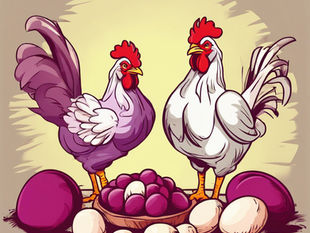
Yes, Chickens Do Live Longer than 2 Years
2
36
(Middle Aged Woman wearing beanie, sweats and raincoat with 2 cats and 2 dogs feeding chickens in Portland Oregon. AI Produced Image)

Who can resist the allure of fresh, home-grown eggs, the desire for a more sustainable lifestyle? This is the time of year when so many of us think, I'm gonna raise some chickens. Chicken Math, where we intend to get 4 chicks but end up with 12, is sometimes just inevitable.
For those who are ready to take on the responsibility, raising backyard chickens can be a wonderful adventure. However, for those who may not have the time, space, or resources, there is another way to enjoy the benefits of fresh eggs while supporting the health and well-being of these animals: supporting your local egg producers.

Currently, I am providing end-of-life care for my sweet 13-year-old Jersey Giant, nicknamed Pizza Thief, real name Fatima. I can only guess that she is experiencing a series of strokes, and her strong body and disposition keep her going. She doesn't seem uncomfortable, is responsive to touch, and occasionally gets gentle sniffs from our younger cat. I don't know the last time she laid an egg, and she was never a regular layer. Perhaps it's because she contracted botulism from eating maggots in an old cat food can I didn't see. One day when she was about 4 months old I watched her become paralyzed, her neck twisting completely around, her feathers starting to slip out. Here is where I discovered the power of the chicken community, people who have raised birds via trial and error for years and years. A kind soul on a chicken community forum walked me through administrating black strap molasses and Epsom salt and stayed up with me throughout the night to make sure they got my panicked messages. Fatima lived. Since then she has survived a respiratory virus, Avian Pox, leg mites, and other mysterious episodes I didn't think she'd live through.
The point of my sharing this is to emphasize that chickens are sentient beings that deserve the best care we can give them. My backyard has more than a few lovely birds who needed more than their owners could give them. I'm grateful for those who recognized that they needed to rehome their birds, I'll never pass judgment. Not everyone has the time or energy to give chickens the care they deserve, and in Fatima's case, that's 13 years of food, shelter, water, medicine, and love.

Supporting Local Egg Producers
Let me fill you in on a secret: chickens do not pay for themselves. They don't. The amount of skimping on care and shelter you have to do to match the price of commercial eggs would likely end up killing your birds. When you read horror stories of a chicken factory catching fire and killing a million birds, that is how cheap eggs are made.
By purchasing eggs from local egg producers in Portland, Oregon, or wherever you are, you can ensure that you are getting high-quality, fresh eggs while also supporting good animal husbandry practices. Local egg producers, like us, are dedicated to maintaining the health and welfare of our flocks. We provide our chickens with ample space to roam, nutritious feed, and a clean, safe environment. This not only leads to happier, healthier chickens but also results in better-tasting, more nutritious eggs for you and your family.
Respect the ovary:
For those curious about how chickens produce eggs, here’s a brief overview of the reproductive system of a hen:
Ovary: Hens have a single functioning ovary (the left one) that contains thousands of potential eggs or ova. Each ovum starts as a tiny yolk.
Oviduct: Once an ovum is released, it travels through the oviduct, where various layers of the egg are added. The oviduct is divided into several sections, each playing a specific role:
Infundibulum: This is where fertilization would occur if the hen had a date with a rooster.
Magnum: The egg white (albumen) is added around the yolk here.
Isthmus: The inner and outer shell membranes are added.
Uterus (Shell Gland): The hard shell is formed around the egg, a process that takes about 20 hours.
Vagina: The egg is then laid through the cloaca. No, it's not all the same hole.
Laying: Most hens lay one egg per day, though this can vary based on the breed, age, and health of the hen. There are glitches, and sometimes those glitches lead to illness, suffering, death. I've lost hens to ovarian infections, ovarian cancer, and after a respiratory virus went through my flock years ago, a couple of hens lost their ability to lay hard shells.
I believe that by understanding the intricate process of egg production, you can better appreciate the effort and care that goes into each egg the chicken lays, and the effort from your local egg producer. While raising backyard chickens can be a rewarding experience, it’s not feasible for everyone. Whether you choose to raise your own flock or support local farmers, you are contributing to a more sustainable and humane approach to egg production. Together we can make a difference in how our animals who we expect food from in one way or another are treated.

Yours in health and love, and may Fatima's journey over the rainbow bridge be peaceful and brief.





